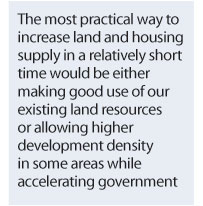Fallow land can be tapped for residential development
Updated: 2017-05-17 07:20
(HK Edition)
|
|||||||
Based on the latest statistics and data, Hong Kong continues to be the most expensive home market in the world. This may mean that less-affluent Hong Kong people can only dream of owning their homes one day. For this reason, it is hoped the new Chief Executive will make more effort to tackle our ongoing housing problem so Hong Kong people will not abandon hope of owning their own homes.
Previously, the government has come up with various initiatives to tackle the high home prices in the market but had little success so far. Take the "Hong Kong property for Hong Kong people" policy for example; it was created as a "Hong Kong people first" measure, meaning flats built under this policy could only be owned by Hong Kong permanent residents in the first 30 years. The public had high expectations that flats built under this scheme would be sold at lower and more affordable prices than prevailing market levels. However, projects developed under this scheme so far have been priced well over HK$10,000 per square foot, with the most expensive flat priced at more than HK$14 million, disappointing many who had hoped for a discount. Obviously projects developed under "Hong Kong people first" schemes have failed to meet the public expectations, putting further stress on those have aspired for home ownership.

First-time homebuyers can only afford to buy small flats. To help them get on the housing ladder, not only do we need to optimize the housing ladder but we also have to increase the overall land and housing supply to rectify the imbalance between demand and supply. Nevertheless, measures such as reclamation and use of underground spaces, as advocated by the government, usually involve approval procedures taking years. Aside from engineering site works, pre-development preparatory procedures such as research, environmental impact assessments and public consultation are too time-consuming, making any effort to increase land and housing supply a tedious process. Therefore, the most practical way to increase land and housing supply in a relatively short time would be either making good use of our existing land resources or allowing higher development density in some areas while accelerating government approval procedures for development.
As far as I know, there are nearly 1,000 hectares (or 10 million square meters) of undeveloped land (mostly in the New Territories) mainly allocated for agricultural use. But because of land-use planning restrictions and tedious application procedures for building developments, including assessments and land premium negotiations, many land parcels lie fallow and have been left in a desolate state. If such land resources can be tapped for residential development, it means there is a huge potential for a significant increase in housing supply. In approving applications for residential development on those sites, the government could add a clause requiring that certain blocks of completed flats be turned over to the government at predetermined prices, which can then be sold to middle-income first-time homebuyers at discounted prices. If 20 percent of those land resources were converted to residential use, there would be more than 200 hectares of land available for residential development. Assuming a development density of three, these land sites will be enough to meet the housing needs of nearly 350,000 people, or more than 100,000 households.
I believe if the government and developers agree to work together, the short-term housing supply and demand imbalance can be solved in no more than three years. This would not only resolve the current housing shortage but would also reduce the pressure of the Hong Kong Housing Authority and Hong Kong Housing Society to build more public housing.
As the old saying goes, a good start is half the success. It is fortunate that Chief Executive-designate Carrie Lam Cheng Yuet-ngor has indicated her intention to tackle the housing problem with various measures including a proposed "starter home" scheme. Even though this initiative could create tension between the government and some political pressure groups, I am confident the authorities are able to cope with any conflict that may arise. In order to restore the balance between housing supply and demand, the government must stand up to the challenges ahead, striving for the well-being of the general public.
The author is founder of the Hong Kong Seek Road organization.
(HK Edition 05/17/2017 page8)